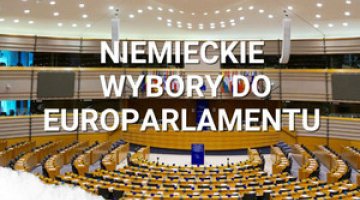Germany and the revolution in North Africa
The events in North Africa have caused Germany to increase its activity in such countries as Tunisia, Egypt and Morocco – both diplomatically and economically and in the area of development assistance. Germany also expressed its commitment to the discussion in the EU about revising the European Neighbourhood Policy towards the EU's Southern neighbours. On the one hand, Germany is seeking to establish bilateral relations with the new leaderships. On the other hand, it is trying to use the changes in the ruling elites and the revision of EU policy to extend its economic and political influences in North Africa.
Germany's reaction to the crisis in the region
On 12 February Guido Westerwelle, the head of German diplomacy, accompanied by representatives of the ministries of the economy and development assistance, visited Tunisia. Nearly two weeks later (on 24 February) he went to Egypt with Dirk Niebel, the minister of development assistance. These had been among the first visits paid by Western politicians of this rank since Ben Ali fled his country and Mubarak was ousted from power. Both visits were combined with promises of political and economic assistance. Minister Niebel declared that he would allocate EUR 20 million from the budget of his ministry to support small-sized companies in Egypt and Tunisia and that in 2012 this amount would be increased to EUR 100 million. Guido Westerwelle offered to conclude a North-South Pact, a long-term programme of economic support for the region through investments made by European businesses and the opening up of the EU market. The pact would be intended to stimulate the creation of new jobs and the raising of living standards in the countries which would receive the aid. In the case of Libya Germany was one of the countries that demanded that UN and EU sanctions be imposed on the regime of Muammar Gaddafi. Germany is however quite sceptical about the introduction of a no-fly zone over Libya and warns against the political and military consequences of such a decision. Germany has made this conditional on the UN Security Council adopting an appropriate resolution and the Arab League and the African Union agreeing on the establishment of a no-fly zone by, for example, NATO.
Strategic objectives of Germany's actions
Germany's actions are aimed at gaining more control over the EU's measures taken with regard to its Southern neighbours, increasing Germany's political and economic influences in North Africa and contributing to the region's stabilisation. Germany's two-way policy – bilateral and EU relations – stems from Berlin's concerns that without German diplomacy's direct involvement in North Africa, German interests will not be taken into consideration. Therefore Germany is trying to achieve as much as possible through bilateral contacts with new governments and at the same time to create EU engagement in North Africa.
Firstly, Germany wants to take over the initiative of establishing EU policy in the region from, for instance, France, whose policy pursued in North Africa so far and whose Union for the Mediterranean project which it has been pushing for in the EU have proven to be a failure. An important condition that acts in favour of Germany in comparison with France, the UK and Italy is the fact that Germany's actions do not provoke negative associations with colonial times. Secondly, Germany's objective is to gain greater access to natural resources, to secure opportunities for economic expansion that is important due to the region's development potential. Guido Westerwelle in this way justified the offer of the North-South Pact. This position is further confirmed by the action plan for North Africa that includes ten points and was prepared by the German Ministry of Economy. The Ministry of the Economy's goal is to strengthen Germany's economic position in the region given the fact that in recent years North Africa's importance for the German economy has been growing systematically. Thirdly, another objective that is important for Germany is supporting stability in the region. Germany fears the consequences of long-term instability in North Africa for its own economy (growing oil prices), for the EU's security (problems with immigration) and for the Israel’s situation. Germany is also worried about the domino effect – the emergence of similar problems in the Middle East, for instance in Saudi Arabia with which Germany has close economic ties. Additionally, bearing in mind that it is performing the function of a non-permanent member of the UN Security Council in 2011 and is seeking to obtain permanent membership, Germany wants to demonstrate that it is committed to solving crisis situations in the world. Furthermore, the situation in North Africa provides an opportunity for Guido Westerwelle (whose party, FDP, for several months has enjoyed support of approximately 5-6%) to regain popularity, particularly at the moment when his main rival Karl-Theodor zu Guttenberg, the former defence minister, has withdrawn from politics.
Germany co-creates the EU's response
Germany is also very active in creating the EU's response to the events in North Africa. In February Guido Westerwelle in a letter for Catherine Ashton and the German non-paper suggested a series of changes in the EU neighbourhood policy geared towards the EU’s Southern neighbours. He argued for making part of payments from the existing programmes conditional on a particular country's progress on the road to democracy, building a state under the rule of law and observing human rights. He also put forward the suggestions of opening the EU market to agricultural goods, easier access to studying at European universities, increased cooperation among higher education establishments and the creation of more possibilities for legal immigration. Most of these recommendations were featured in the document elaborated by the European Commission and the High Representative of the Union for Foreign Affairs and Security Policy Catherine Ashton - “A Partnership for Democracy and Shared Prosperity with the Southern Mediterranean”. This document will be discussed on 11 March at the EU summit devoted to the situation in North Africa.
However, Germany does not want EU policy to be revised at the expense of the EU's relations with its Eastern neighbours since potential crisis situations in the Eastern neighbourhood would affect Germany's economic, political, energy and security interests to a larger extent. Despite its substantial involvement in solving the conflicts in North Africa – both in the region and at the EU level – Germany is arguing for balancing the Southern and Eastern dimensions of the EU’s neighbourhood policy and not favouring either of them. This is proven by the statements in Westerwelle's letter and the German non-paper. Another significant signal was Westerwelle's visit to Ukraine (on 2 March 2011) and above all his participation in the meeting of the heads of the ministries of foreign affairs of the Visegrad group's member states with their counterparts from the states of the Eastern Partnership. Also Commissioner Štefan Füle and Catherine Ashton took part in this meeting.





